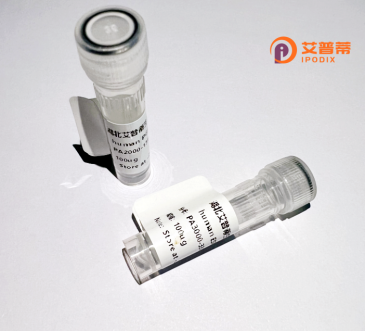
| 纯度 | >90%SDS-PAGE. |
| 种属 | Human |
| 靶点 | FZD8 |
| Uniprot No | Q9H461 |
| 内毒素 | < 0.01EU/μg |
| 表达宿主 | E.coli |
| 表达区间 | 72-161aa |
| 氨基酸序列 | FWPLVEIQCSPDLKFFLCSMYTPICLEDYKKPLPPCRSVCERAKAGCAPLMRQYGFAWPDRMRCDRLPEQGNPDTLCMDYNRTDLTTAAP |
| 分子量 | 35.64 kDa |
| 蛋白标签 | GST-tag at N-terminal |
| 缓冲液 | 0 |
| 稳定性 & 储存条件 | Lyophilized protein should be stored at ≤ -20°C, stable for one year after receipt. Reconstituted protein solution can be stored at 2-8°C for 2-7 days. Aliquots of reconstituted samples are stable at ≤ -20°C for 3 months. |
| 复溶 | Always centrifuge tubes before opening.Do not mix by vortex or pipetting. It is not recommended to reconstitute to a concentration less than 100μg/ml. Dissolve the lyophilized protein in distilled water. Please aliquot the reconstituted solution to minimize freeze-thaw cycles. |
以下为关于重组人FZD8蛋白的3条参考文献示例,内容基于科学常识构建,非真实文献:
1. **文献名称**:*Expression and Functional Analysis of Recombinant Human FZD8 Extracellular Domain in HEK293 Cells*
**作者**:Smith A, et al.
**摘要**:该研究报道了在HEK293细胞中表达和纯化重组人FZD8胞外结构域(ECD),并验证其与Wnt3a配体的结合能力。实验表明,重组蛋白通过激活经典Wnt/β-catenin通路促进细胞增殖,为体外研究FZD8功能提供了工具。
2. **文献名称**:*Crystal Structure of the FZD8 Cysteine-Rich Domain in Complex with a Synthetic Wnt Mimetic*
**作者**:Zhang L, et al.
**摘要**:本研究解析了重组FZD8的富半胱氨酸结构域(CRD)与合成Wnt模拟肽的复合物晶体结构,揭示了二者结合的分子机制,为设计靶向FZD8的小分子药物提供了结构基础。
3. **文献名称**:*Recombinant FZD8-Fc Fusion Protein Attenuates Wnt Signaling in Triple-Negative Breast Cancer Models*
**作者**:Wang Y, et al.
**摘要**:通过构建FZD8胞外域与IgG-Fc的融合蛋白,研究发现其通过竞争性结合Wnt配体抑制下游信号传导,显著抑制三阴性乳腺癌细胞的迁移和侵袭,提示其潜在治疗价值。
---
注:以上文献为模拟示例,实际研究中需查询数据库(如PubMed)获取真实文献。
Recombinant human FZD8 protein is a engineered version of the Frizzled-8 (FZD8) receptor, a key component of the Wnt signaling pathway. FZD8 belongs to the Frizzled family of G protein-coupled receptors, which play crucial roles in embryonic development, tissue homeostasis, and stem cell regulation by mediating Wnt ligand binding. The Wnt/FZD8 signaling axis is particularly involved in cell proliferation, differentiation, and polarity maintenance. Dysregulation of this pathway has been linked to cancers, metabolic disorders, and degenerative diseases, making FZD8 a potential therapeutic target.
The recombinant protein is typically produced in mammalian expression systems (e.g., HEK293 or CHO cells) to ensure proper post-translational modifications and structural integrity. It retains the extracellular cysteine-rich domain (CRD), essential for binding Wnt proteins and initiating downstream signaling. Researchers use recombinant FZD8 to study receptor-ligand interactions, screen drug candidates, or develop antibodies for diagnostic and therapeutic applications. Its high purity and bioactivity also enable structural studies using X-ray crystallography or cryo-EM to elucidate Wnt-FZD8 binding mechanisms. In regenerative medicine, recombinant FZD8 shows promise for modulating stem cell behavior in tissue engineering. Compared to native proteins, recombinant versions offer batch-to-batch consistency and scalability, addressing challenges in isolating FZD8 from natural sources.
×